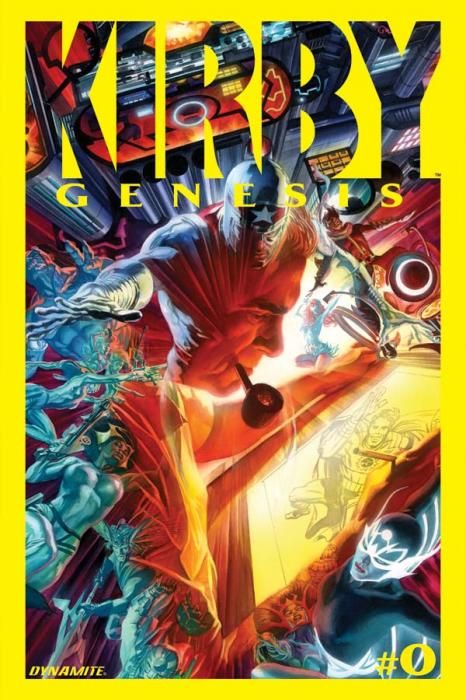"Kirby: Genesis" reunites the "Marvels" duo of Kurt Busiek and Alex Ross, joined by artist Jack Herbert, to tell the story of a universe populated by the Jack Kirby characters not owned by Marvel and DC. Whether known like Captain Victory and the Silver Star, or barely anything more than a sketch and a name, Busiek and Ross are using them all, trying to tell a coherent story. This zero issue is a preview of the series along with some backmatter. Although, exactly what kind of comic this previews is anyone's guess; it reads like a pseudo-retro mess.
Starting with the premise that, on this world, the plaque Kirby designed as an alternative to the one adorning the Pioneer 10 space probe as part of a "Los Angeles Times" feature was used by NASA instead of the more realistic depiction of humanity, the issue flits from scene to scene, never stopping. Ultimately, it all adds up to vignettes lacking context and purpose. Chaotic jumps that don't come close to forming a narrative or indicating what the series itself will be about. Kirby's characters make brief appearances, but are ciphers, just visuals with empty words surrounding them. Struggling to figure out the larger picture seems useless, as a few readings of this issue proved to me.
Busiek's narration and the use of Pioneer 10 tries to hold it all together, but his narration is so overwrought that it explains little. The comic portion of this very literally reads like the concept: take a bunch of Kirby's post-Silver Age characters and toss them together. Perhaps a logical plot and story will form once the series proper begins. There's just nothing here that suggests that to be the case.
Ross provides the art direction and layouts, quite detailed as the backmatter shows, and a more un-Kirby-like approach you couldn't find. Kirby's comics oozed clarity and energy, while the art here uses jagged panel layouts that seemingly emphasize a more design-driven approach, and lack solid storytelling and verve. The pages just sit there without any spark of energy, stuck in staid, static layouts that require multiple reads to actually understand. Herbert's line work itself has a nice quality that's hindered by the layouts Ross provides, and makes me wonder what this comic would look like if Herbert could deliver a more traditional approach to page compositions.
The backmatter is more effective at selling the concept of the book than the comic book portion, if only because of the presence of Kirby's sketches and designs. The contrast between his work and what precedes it does "Kirby: Genesis" no favors. There's little new for the big Kirby fans, but the more casual lover of Kirby's art should find something they haven't seen yet.
The concept of a one dollar preview book is a good one as many publishers have shown, especially balancing the book between comic and bonus materials. "Kirby: Genesis" #0 fails on execution, providing little hint of what the series will actually be about besides 'throw Kirby characters together and see what happens.' Not much of a concept and not much of a comic. If Kirby's name wasn't in the title and his concept art wasn't in the back, I wouldn't know this had anything to do with him.

